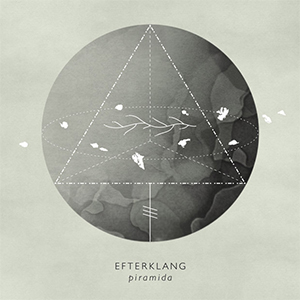Efterklang - Piramida (4AD)
The arc of Efterklang’s career so far has been an unusual one. Whereas most bands develop an increasingly (often disastrous) experimental streak several albums in, Efterklang started life ten years ago as a swooping, jangling, orchestral misch-masch of rhythms and melody, but now create quite straightforwardly structured (if still layered and beautiful) songs. This shift was already apparent on their last album, Magic Chairs, but on Piramida, the transformation is complete.
Released Sep 21st, 2012 via 4AD / By Adam Corner
 Where once you would instinctively file Efterklang as a Danish counterpart to the lush, Icelandic avant-pop scene, they now have more in common stylistically with high-end American bands like The National. One change that’s impossible to ignore is the elevation of Casper Clausen’s vocals to centre stage. This is now a band with a lead singer – not a gang of multi-instrumentalists competing for your attention.
Where once you would instinctively file Efterklang as a Danish counterpart to the lush, Icelandic avant-pop scene, they now have more in common stylistically with high-end American bands like The National. One change that’s impossible to ignore is the elevation of Casper Clausen’s vocals to centre stage. This is now a band with a lead singer – not a gang of multi-instrumentalists competing for your attention. For fans who’ve been around since the early days, this can’t help but be ever-so-slightly disappointing – their more recent material doesn’t have the vitality and endearing weightlessness that early releases did. But taking Piramida on its own merits, there is still a lot to love.
'Sedna' is a soft lament backed by a ghostly choir, and is a gently sinister and mournful offering. 'Black Summer' begins with a wonky, brass-led build up and ends with an extended, sultry shuffle through the ether. 'Between The Walls' introduces some skittering electronic production into the mix, and sounds all the fresher for it. 'Dreams Today' is a tantalising taste of the old Efterklang, but at only 3 minutes in length, feels like one third of an Efterklang workout from the Parades days.
Efterklang - 'Hollow Mountain'
There is a backstory to the album: almost all of the sounds were either captured during, or were inspired by, a trip to the town the gives the album its name. But while this is a nice touch, the straightforward structure of the songs don’t really provide the space these field recordings need to breathe.
When Efterklang blend the computerised, the organic, and the orchestral together, they offer something no-one else can, and there are still hints of this on Piramida. But while there isn’t a single weak track on here, there is no soaring high point either, and the album drifts by just that bit too easily.





 All Content RSS Feed
All Content RSS Feed
Follow Bearded on...